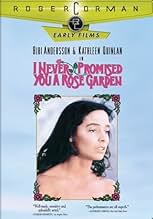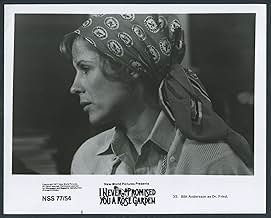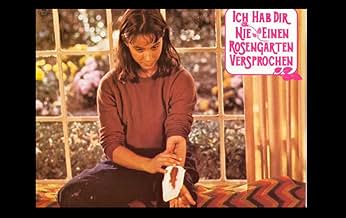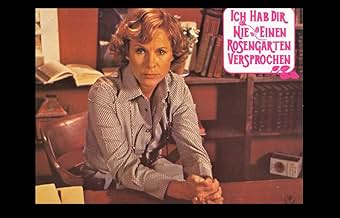Jamais je ne t'ai promis un jardin de roses
Original title: I Never Promised You a Rose Garden
IMDb RATING
6.4/10
1.7K
YOUR RATING
A disturbed, institutionalized 16-year-old girl struggles between fantasy and reality.A disturbed, institutionalized 16-year-old girl struggles between fantasy and reality.A disturbed, institutionalized 16-year-old girl struggles between fantasy and reality.
- Director
- Writers
- Stars
- Nominated for 1 Oscar
- 4 nominations total
Karin Collison
- Nurse
- (as Elizabeth Dartmoor)
Barbara Steele
- Idat
- (scenes deleted)
- Director
- Writers
- All cast & crew
- Production, box office & more at IMDbPro
Featured reviews
This isn't a film that always works, but when it does, it finds its way so deep under your skin that the pain is surprising. The acting is what stands above everything else here. I suppose I'd seen Kathleen Quinlan before, but I can't say I've ever really noticed her. Maybe it's because she's so young, so human here that it stands out amongst everything else she did before and after this. Her performance is wild, heartbreaking, intensely realized. Other performances, like Bibi Andersson, are great, but not as essential as Quinlan.
This is ground that has been covered with perhaps more consistency (in a cinematic sense) with films like "Girl, Interrupted" but never with the same emotional depth as here. Anthony Page makes a lot of strange, even bad directorial decisions perhaps, but he captures a crazed, uneasy tone in the cinematography and performances that brings it all together. The only odd points are the off-center dreams/hallucination sequences and out-of-place soundtrack. If you can overlook these, this is a truly great film. It really tore my heart out.
This is ground that has been covered with perhaps more consistency (in a cinematic sense) with films like "Girl, Interrupted" but never with the same emotional depth as here. Anthony Page makes a lot of strange, even bad directorial decisions perhaps, but he captures a crazed, uneasy tone in the cinematography and performances that brings it all together. The only odd points are the off-center dreams/hallucination sequences and out-of-place soundtrack. If you can overlook these, this is a truly great film. It really tore my heart out.
Deborah Blake (Kathleen Quinlan) is admitted to a country institution by her high street parents, unable to cope with the ignominy brought upon them, by her erratic, anti-social behaviour.
Taunted by her inner-demons (to which we're treated inventively from the mind's eye perspective), she's gradually cajoled from her psychosis by the unassuming, yet fiercely determined treating doctor - Bibi Andersson delivering a warm, sympathetic performance and headlining an impressive female cast that includes Signe Hasso, Susan Tyrrell, Diane Varsi, Silvia Sidney, screenwriter /actress Darlene Craviotto and taking a short break from her maternal duties on Martha's Vineyard, Lorraine Gary.
Along the journey, there's a couple of plot diversions, some poignant, others hackneyed and exploitative, but then would New World Pictures ever have distributed this movie without a stereotypical bully nurse scenario? Unlikely.
The Roger Corman production combines cinematic liberties with an at-times reverent translation of the Hannah Green novel, creating a compelling B-movie possessing an unusual dramatic-fantasy film tone. A cynical viewer might postulate that Corman saw a payday following the success of "One Flew Over the Cukoo's Nest", and to a large extent, this remains exploitative cinema. That said, Quinlan's performance clearly defies that brand, her characterisation personifies trauma and whilst often intense, isn't overcooked.
You have to commend New World Pictures for taking the plunge with this release against type, especially when you consider the other titles in their production line and catalogue at the time; 'Rose Garden' is a very different breed to your typical locally made New World Picture. Not perfect by any means and does have a tendency to stigmatise the subject matter, nevertheless an enjoyable film in spite of its flaws.
Taunted by her inner-demons (to which we're treated inventively from the mind's eye perspective), she's gradually cajoled from her psychosis by the unassuming, yet fiercely determined treating doctor - Bibi Andersson delivering a warm, sympathetic performance and headlining an impressive female cast that includes Signe Hasso, Susan Tyrrell, Diane Varsi, Silvia Sidney, screenwriter /actress Darlene Craviotto and taking a short break from her maternal duties on Martha's Vineyard, Lorraine Gary.
Along the journey, there's a couple of plot diversions, some poignant, others hackneyed and exploitative, but then would New World Pictures ever have distributed this movie without a stereotypical bully nurse scenario? Unlikely.
The Roger Corman production combines cinematic liberties with an at-times reverent translation of the Hannah Green novel, creating a compelling B-movie possessing an unusual dramatic-fantasy film tone. A cynical viewer might postulate that Corman saw a payday following the success of "One Flew Over the Cukoo's Nest", and to a large extent, this remains exploitative cinema. That said, Quinlan's performance clearly defies that brand, her characterisation personifies trauma and whilst often intense, isn't overcooked.
You have to commend New World Pictures for taking the plunge with this release against type, especially when you consider the other titles in their production line and catalogue at the time; 'Rose Garden' is a very different breed to your typical locally made New World Picture. Not perfect by any means and does have a tendency to stigmatise the subject matter, nevertheless an enjoyable film in spite of its flaws.
10rrrusty
I agree completely with Dara. I was 20 when I saw it and I would recommend reading the book first, which gives you the background for Deborah's dreamlife. The film can't even begin to show the cruel beauty of her inner world, and (perhaps appropriately) omits any reference to her ethnic and familial demons.
When I think of this movie, I see the look in Kathleen Quinlan's eyes. Her performance is precocious and utterly...amazing, especially for an actress just into her 20's. She seems possessed, wholly inhabited by the character of Deborah, and her scenes with Bibi Andersson are magical. I would credit the director and cinematographer with the wonderful feel of the movie, but Quinlan's portrayal of a young girl marooned in a parallel universe of her mind's own devising is timeless.
When I think of this movie, I see the look in Kathleen Quinlan's eyes. Her performance is precocious and utterly...amazing, especially for an actress just into her 20's. She seems possessed, wholly inhabited by the character of Deborah, and her scenes with Bibi Andersson are magical. I would credit the director and cinematographer with the wonderful feel of the movie, but Quinlan's portrayal of a young girl marooned in a parallel universe of her mind's own devising is timeless.
Not a movie to catch if you're feeling down. Those scenes in the dayroom where the afflicted patients mingle are almost scary. Each woman acts out her own version of mental derangement, from hollering, to yelling in-your-face, to grabbing and shoving. Looks to me like the Pittsburgh Steelers are needed to keep order. In fact, I can't understand why therapeutic science would allow such intermingling among the psychologically afflicted. Just what the therapeutic effects might be is beyond me. Actually the tormented images brought back similar ones from the 1948 flick, The Snake Pit, that scared the heck out of me as a kid, except this 1977 epic should maybe be called The Demon Pit. I guess this movie's ironic title was so as not to scare off prospective viewers.
Actually what holds the movie together are outstanding performances by the two leading actresses, Quinlan and Andersson. I don't think I've seen a more emotionally affecting turn than Quinlan's, as her teenage Deborah poignantly struggles with inner demons she imagines as some kind of tyrannical barbarians. Aside from that inner struggle, we unfortunately know little about her or why she has lost her grip. Or for that matter do we know much about any of the many characters roaming the halls. Coming to Debbie's aid is psychiatrist Dr. Fried portrayed winningly by Swedish actress Andersson. She's low-key in her methods and between the two there's a growing magnetism that brings us back from the scenes of torment. To me, Quinlan at least deserved an Oscar nomination as I don't think I've been so moved in 70 years of movie watching as by her huggable presence. Also, it's good to see vintage actress Sylvia Sydney picking up a payday. Forty years earlier and that fine soulful actress could have succeeded as the poignant young Deborah.
(In Passing: Though it passes by quickly, note Deborah's unconventionally hairy armpit, showing her rejection of a significant gender norm. It also shows production's careful attention to minor detail.)
All in all, the movie's too exotic for me to rate on the usual scale. But, despite the histrionics and foggy chairacter backgrounds, you may want to catch its engagingly sensitive core.
Actually what holds the movie together are outstanding performances by the two leading actresses, Quinlan and Andersson. I don't think I've seen a more emotionally affecting turn than Quinlan's, as her teenage Deborah poignantly struggles with inner demons she imagines as some kind of tyrannical barbarians. Aside from that inner struggle, we unfortunately know little about her or why she has lost her grip. Or for that matter do we know much about any of the many characters roaming the halls. Coming to Debbie's aid is psychiatrist Dr. Fried portrayed winningly by Swedish actress Andersson. She's low-key in her methods and between the two there's a growing magnetism that brings us back from the scenes of torment. To me, Quinlan at least deserved an Oscar nomination as I don't think I've been so moved in 70 years of movie watching as by her huggable presence. Also, it's good to see vintage actress Sylvia Sydney picking up a payday. Forty years earlier and that fine soulful actress could have succeeded as the poignant young Deborah.
(In Passing: Though it passes by quickly, note Deborah's unconventionally hairy armpit, showing her rejection of a significant gender norm. It also shows production's careful attention to minor detail.)
All in all, the movie's too exotic for me to rate on the usual scale. But, despite the histrionics and foggy chairacter backgrounds, you may want to catch its engagingly sensitive core.
If you've already read the book this film is a disappointment. If you haven't read it you are better off skipping the film and getting the book. The film removes too much of the book and basically makes little sense.
The film implies that Deborah's urethral cancer caused her schizophrenia. Which does a disservice to both the book and to the understanding of schizophrenia. Her other world is quite boring in the film and much richer in the book.
The cast is a good one which is why it warrants stars at all. And they do a good job at acting with what they had to work with.
The film implies that Deborah's urethral cancer caused her schizophrenia. Which does a disservice to both the book and to the understanding of schizophrenia. Her other world is quite boring in the film and much richer in the book.
The cast is a good one which is why it warrants stars at all. And they do a good job at acting with what they had to work with.
Did you know
- TriviaThe lead female role of of Deborah Blake in this picture was previously intended for Natalie Wood who had unrealized plans to both produce and star in the movie. Wood once had planned to produce the picture as well as star in it in the role of Deborah Blake but those plans never materialized. The part in the end was played in the film by Kathleen Quinlan.
- GoofsIn the New Year's Eve party scene, Deborah is seen with loose hair talking to Dr. Fried and then there is a close-up of Deborah with her hair pulled back from her forehead.
- Quotes
Deborah Blake: You can turn me off, you know. You can go off with your friends and write another paper on schizophrenia and get an award for it. But I can't turn me off. So I'm calling off the fight.
Dr. Fried: So you quit. Stay in the nuthouse for the rest of your life.
- How long is I Never Promised You a Rose Garden?Powered by Alexa
Details
- Release date
- Country of origin
- Official site
- Language
- Also known as
- I Never Promised You a Rose Garden
- Production companies
- See more company credits at IMDbPro
Contribute to this page
Suggest an edit or add missing content

Top Gap
By what name was Jamais je ne t'ai promis un jardin de roses (1977) officially released in India in English?
Answer

































